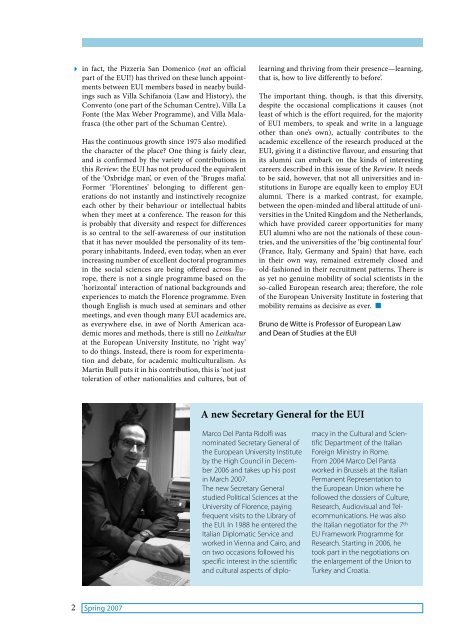Spring 2007 - European University Institute
Spring 2007 - European University Institute
Spring 2007 - European University Institute
Create successful ePaper yourself
Turn your PDF publications into a flip-book with our unique Google optimized e-Paper software.
}<br />
in fact, the Pizzeria San Domenico (not an official<br />
part of the EUI!) has thrived on these lunch appointments<br />
between EUI members based in nearby buildings<br />
such as Villa Schifanoia (Law and History), the<br />
Convento (one part of the Schuman Centre), Villa La<br />
Fonte (the Max Weber Programme), and Villa Malafrasca<br />
(the other part of the Schuman Centre).<br />
Has the continuous growth since 1975 also modified<br />
the character of the place? One thing is fairly clear,<br />
and is confirmed by the variety of contributions in<br />
this Review: the EUI has not produced the equivalent<br />
of the ‘Oxbridge man’, or even of the ‘Bruges mafia’.<br />
Former ‘Florentines’ belonging to different generations<br />
do not instantly and instinctively recognize<br />
each other by their behaviour or intellectual habits<br />
when they meet at a conference. The reason for this<br />
is probably that diversity and respect for differences<br />
is so central to the self-awareness of our institution<br />
that it has never moulded the personality of its temporary<br />
inhabitants. Indeed, even today, when an ever<br />
increasing number of excellent doctoral programmes<br />
in the social sciences are being offered across Europe,<br />
there is not a single programme based on the<br />
‘horizontal’ interaction of national backgrounds and<br />
experiences to match the Florence programme. Even<br />
though English is much used at seminars and other<br />
meetings, and even though many EUI academics are,<br />
as everywhere else, in awe of North American academic<br />
mores and methods, there is still no Leitkultur<br />
at the <strong>European</strong> <strong>University</strong> <strong>Institute</strong>, no ‘right way’<br />
to do things. Instead, there is room for experimentation<br />
and debate, for academic multiculturalism. As<br />
Martin Bull puts it in his contribution, this is ‘not just<br />
toleration of other nationalities and cultures, but of<br />
<strong>Spring</strong> <strong>2007</strong><br />
A new Secretary General for the EUI<br />
Marco Del Panta Ridolfi was<br />
nominated Secretary General of<br />
the <strong>European</strong> <strong>University</strong> <strong>Institute</strong><br />
by the High Council in December<br />
2006 and takes up his post<br />
in March <strong>2007</strong>.<br />
The new Secretary General<br />
studied Political Sciences at the<br />
<strong>University</strong> of Florence, paying<br />
frequent visits to the Library of<br />
the EUI. In 1988 he entered the<br />
Italian Diplomatic Service and<br />
worked in Vienna and Cairo, and<br />
on two occasions followed his<br />
specific interest in the scientific<br />
and cultural aspects of diplo-<br />
learning and thriving from their presence—learning,<br />
that is, how to live differently to before’.<br />
The important thing, though, is that this diversity,<br />
despite the occasional complications it causes (not<br />
least of which is the effort required, for the majority<br />
of EUI members, to speak and write in a language<br />
other than one’s own), actually contributes to the<br />
academic excellence of the research produced at the<br />
EUI, giving it a distinctive flavour, and ensuring that<br />
its alumni can embark on the kinds of interesting<br />
careers described in this issue of the Review. It needs<br />
to be said, however, that not all universities and institutions<br />
in Europe are equally keen to employ EUI<br />
alumni. There is a marked contrast, for example,<br />
between the open-minded and liberal attitude of universities<br />
in the United Kingdom and the Netherlands,<br />
which have provided career opportunities for many<br />
EUI alumni who are not the nationals of these countries,<br />
and the universities of the ‘big continental four’<br />
(France, Italy, Germany and Spain) that have, each<br />
in their own way, remained extremely closed and<br />
old-fashioned in their recruitment patterns. There is<br />
as yet no genuine mobility of social scientists in the<br />
so-called <strong>European</strong> research area; therefore, the role<br />
of the <strong>European</strong> <strong>University</strong> <strong>Institute</strong> in fostering that<br />
mobility remains as decisive as ever. n<br />
Bruno de Witte is Professor of <strong>European</strong> Law<br />
and Dean of Studies at the EUI<br />
macy in the Cultural and Scientific<br />
Department of the Italian<br />
Foreign Ministry in Rome.<br />
From 2004 Marco Del Panta<br />
worked in Brussels at the Italian<br />
Permanent Representation to<br />
the <strong>European</strong> Union where he<br />
followed the dossiers of Culture,<br />
Research, Audiovisual and Telecommunications.<br />
He was also<br />
the Italian negotiator for the 7 th<br />
EU Framework Programme for<br />
Research. Starting in 2006, he<br />
took part in the negotiations on<br />
the enlargement of the Union to<br />
Turkey and Croatia.

















